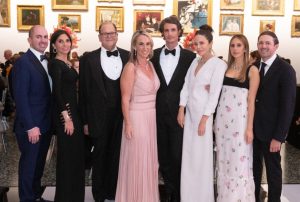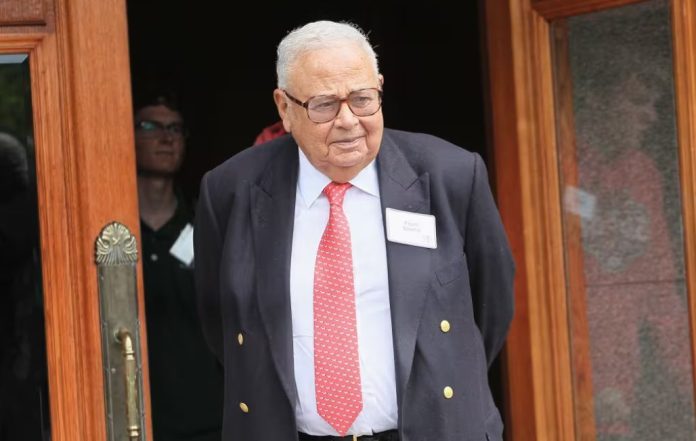Table of Contents
Christopher Sarofim stands among the most influential yet understated figures in American finance.
As the son of the late Fayez Sarofim often dubbed “The Sphinx” of Wall Street Christopher has not only inherited a substantial financial legacy but also emerged as a strategic investor in his own right.
In 2025, with the investment world under increased scrutiny and global markets evolving rapidly, Sarofim’s approach to wealth and financial management presents a fascinating case study.
This article examines his current net worth, the foundations of his wealth, and his role in shaping the future of conservative investment philosophy.
Who Is Christopher Sarofim and What Is His Background?

Image – Source
Christopher Sarofim was born into a family with deep roots in American finance. His father, Fayez Sarofim, was an Egyptian-American billionaire and the founder of Fayez Sarofim & Co., a respected investment management firm headquartered in Houston, Texas.
Growing up in a household deeply entrenched in financial strategy and long-term wealth planning, Christopher was exposed to market fundamentals from an early age.
He pursued an elite education, earning a degree from Princeton University before obtaining an MBA from Harvard Business School.
These academic achievements laid a robust foundation for his future endeavours in asset management.After completing his studies, he joined the family firm and steadily worked his way up the ranks.
Unlike many heirs to vast fortunes, Christopher demonstrated a genuine commitment to mastering the complexities of investment rather than simply riding on his surname.
How Did Christopher Sarofim Build His Wealth?
Though Christopher Sarofim’s financial journey began with the advantage of inherited wealth, it is his professional discipline and deep involvement in portfolio management that have solidified his status as a self-made financial authority.
Upon joining Fayez Sarofim & Co., he focused on mastering the intricacies of equity markets and investment strategy.
Over the years, he assumed increasing responsibility, managing billions of dollars in assets and developing a reputation for prudence and analytical rigour.
His investment approach aligns with the firm’s ethos buying high-quality companies and holding them for the long term.
He avoided the high-risk, high-reward models that dominate Silicon Valley, instead concentrating on steady growth, dividend yield, and financial stability.
Christopher has also played a pivotal role in expanding the firm’s influence beyond traditional investment clients to include charitable organisations and educational endowments, thereby diversifying the client base and ensuring long-term firm sustainability.
What Is Christopher Sarofim’s Net Worth in 2025?
As of 2025, Christopher Sarofim’s estimated net worth is approximately £1.4 billion, or $1.75 billion USD. This figure reflects both inherited assets and self-generated wealth accumulated through his management of Fayez Sarofim & Co., direct equity investments, and other financial interests.
Industry analysts attribute a steady rise in his net worth over recent years to prudent diversification, particularly in defensive sectors like healthcare and consumer goods, which have remained resilient through market fluctuations.
| Year | Estimated Net Worth (USD) | Estimated Net Worth (GBP) |
| 2020 | $1.2 billion | £950 million |
| 2022 | $1.5 billion | £1.2 billion |
| 2025 | $1.75 billion | £1.4 billion |
His inclusion in lists of high-net-worth individuals is consistent with the growing valuation of the firm’s assets under management and his expanding influence in strategic investment circles.
What Are the Main Sources of Christopher Sarofim’s Income?

Image – Source
Christopher Sarofim’s income is generated from a well-structured and diversified financial base. The most significant portion comes from his leadership role at Fayez Sarofim & Co., where he earns through management fees and equity in the firm’s overall profits.
As managing director, he directly oversees large portfolios, which yields substantial returns. Another consistent source of income is dividends from long-term holdings in blue-chip companies.
Sarofim holds stakes in some of the most profitable corporations in the United States, such as Coca-Cola, Kinder Morgan, and Philip Morris. These investments provide steady dividend income and have appreciated considerably in value over the years.
Additionally, Sarofim earns through real estate investments and advisory positions on several corporate boards. These appointments often come with equity shares or retainers, which contribute significantly to his annual income.
How Does Christopher Sarofim Compare to Other Elite Investors in America?
When placed alongside titans like Warren Buffett or Ray Dalio, Christopher Sarofim may not command the same media attention, but his financial strategies and results speak volumes.
His net worth is more modest by comparison, yet his success is anchored in a conservative approach that has proven durable even in volatile market conditions.
| Investor | 2025 Net Worth (USD) | Investment Style |
| Warren Buffett | $117 billion | Value investing |
| Ray Dalio | $20 billion | Macro/global strategy |
| Christopher Sarofim | $1.75 billion | Long-term equity holding |
What sets him apart is his commitment to traditional values of investing minimising turnover, selecting high-quality stocks, and avoiding speculation.
His results may not be as spectacular in the short term as some aggressive investors, but his consistency ensures long-term stability and wealth preservation.
What Companies and Assets Does Christopher Sarofim Have a Stake In?
Christopher Sarofim’s financial interests span multiple sectors and companies, reflecting a diversified investment philosophy. At the core of his wealth lies his ownership and executive role at Fayez Sarofim & Co., which manages tens of billions in assets.
He is also known for maintaining significant holdings in several publicly traded companies, particularly those in stable industries.
These include Kinder Morgan in the energy sector, Coca-Cola in consumer goods, and Philip Morris in tobacco all long-standing investments with high dividends and strong historical performance.
| Company | Sector | Type of Investment |
| Kinder Morgan | Energy | Long-term equity |
| Coca-Cola | Consumer Goods | Dividend-paying stock |
| Philip Morris | Tobacco | Legacy investment |
| Fayez Sarofim & Co. | Finance | Ownership/Management |
| Multiple REITs | Real Estate | Equity |
His portfolio is managed with a focus on capital preservation, echoing the philosophy of his late father and the firm’s commitment to low-risk, high-quality assets.
How Has the Sarofim Family Legacy Influenced His Financial Standing?

Image – Source
The influence of the Sarofim family is deeply intertwined with Christopher’s financial journey. Fayez Sarofim was widely regarded as one of the most intelligent and disciplined investors of his time.
His guidance shaped the principles that now define Christopher’s approach to wealth management. Beyond monetary inheritance, Christopher also inherited a network of influential clients and financial peers.
This network, built on trust and decades of performance, has enabled him to sustain and grow the firm’s assets under management.
The Sarofim name opens doors in business, but Christopher has ensured it remains synonymous with integrity, stability, and conservative financial growth.
What Can We Learn from Christopher Sarofim’s Investment Strategy?
Christopher Sarofim’s success offers important insights for both seasoned investors and newcomers to the financial world.
His emphasis on holding quality companies for the long term, even during market downturns, reflects a level of patience rarely seen in today’s fast-moving financial climate.
His strategy includes rigorous research, risk mitigation through diversification, and a refusal to chase trends.
Instead of attempting to time the market or bet on volatile sectors, Sarofim’s approach is grounded in selecting companies with strong fundamentals and predictable cash flows.
In many ways, his investment philosophy mirrors that of Warren Buffett buy good companies, hold them, and let compounding do the rest.
For investors looking for a timeless model of wealth accumulation, Christopher Sarofim stands as a compelling example.
Conclusion
Christopher Sarofim’s net worth in 2025, estimated at £1.4 billion, reflects more than inherited fortune. It encapsulates decades of disciplined investment, strategic leadership, and a clear vision for sustainable growth.
As the financial world shifts and adapts to technological disruption and economic uncertainty, Sarofim’s unwavering commitment to core principles provides a stable beacon.
His journey illustrates that legacy and innovation can coexist and in his case, they can thrive.
Featured Image – Source
FAQs About Christopher Sarofim’s Wealth
What is the history of Fayez Sarofim & Co.?
Founded in 1958 by Fayez Sarofim, the firm has built a reputation for long-term value investing, managing billions in assets across conservative equity portfolios.
Is Christopher Sarofim actively managing investments in 2025?
Yes, Christopher continues to serve as a managing director at Fayez Sarofim & Co., guiding client portfolios and firm strategy.
How accurate are celebrity net worth estimations?
Net worth figures are typically based on public disclosures, stock holdings, real estate, and business ownership. Actual wealth may vary due to private assets or market fluctuations.
What is Sarofim’s role in Houston’s financial scene?
Christopher is a key figure in Houston’s investment landscape, both for his business activities and philanthropic involvement in the local community.
Has Christopher Sarofim been involved in philanthropy?
Yes, he supports several educational and medical charities, continuing his father’s legacy of giving back to society through the Sarofim Foundation.
What are the main industries in Sarofim’s portfolio?
His portfolio includes energy, consumer goods, healthcare, finance, and real estate all sectors known for stability and long-term potential.
How does Sarofim’s investment strategy compare to Warren Buffett’s?
Both investors follow a value-driven, long-term approach with a preference for companies that demonstrate strong cash flow, dividends, and consistent growth.

